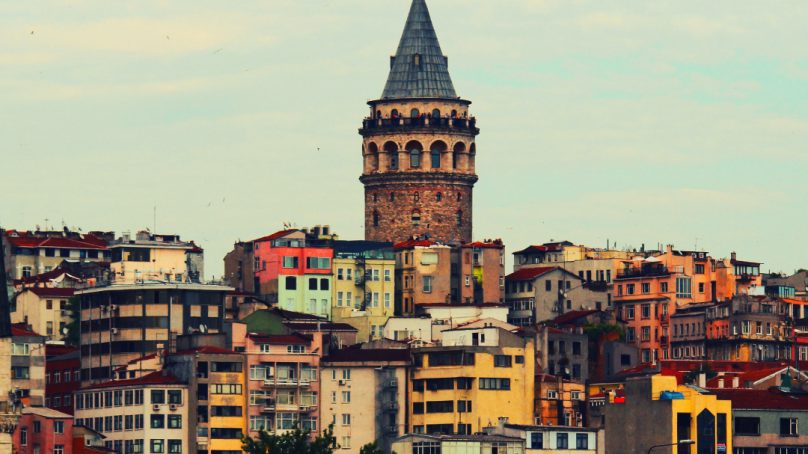

Tourism is one of the key pillars for Vision 2023, which aims to solidify the country’s appeal as a major hub for people and capital flows. Indeed, the goal is to place Turkey among the world’s 10 strongest economies by 2023 (a target of GDP of USD 2 trillion).
While Turkish tourism has witnessed several setbacks in the last decade due to the geopolitical instability, economic downturn and most recently the impact of Covid-19, it has repeatedly proven its resilience through the country’s diverse tourism offering and well-developed infrastructure.
A diverse offering
Turkey has strong fundamentals as a tourism destination, offering diverse experiences and enhanced connectivity to its visitors with a unique location between Europe and Asia. Since the liberalization of the Turkish economy in the 1980s, tourism has been a catalyst for economic growth, boosting the country’s exports in order to offset its lasting trade deficit. Consequently, the tourism industry has been identified as a strategic lever to improve Turkey’s economic welfare and achieve its Vision 2023 objectives.
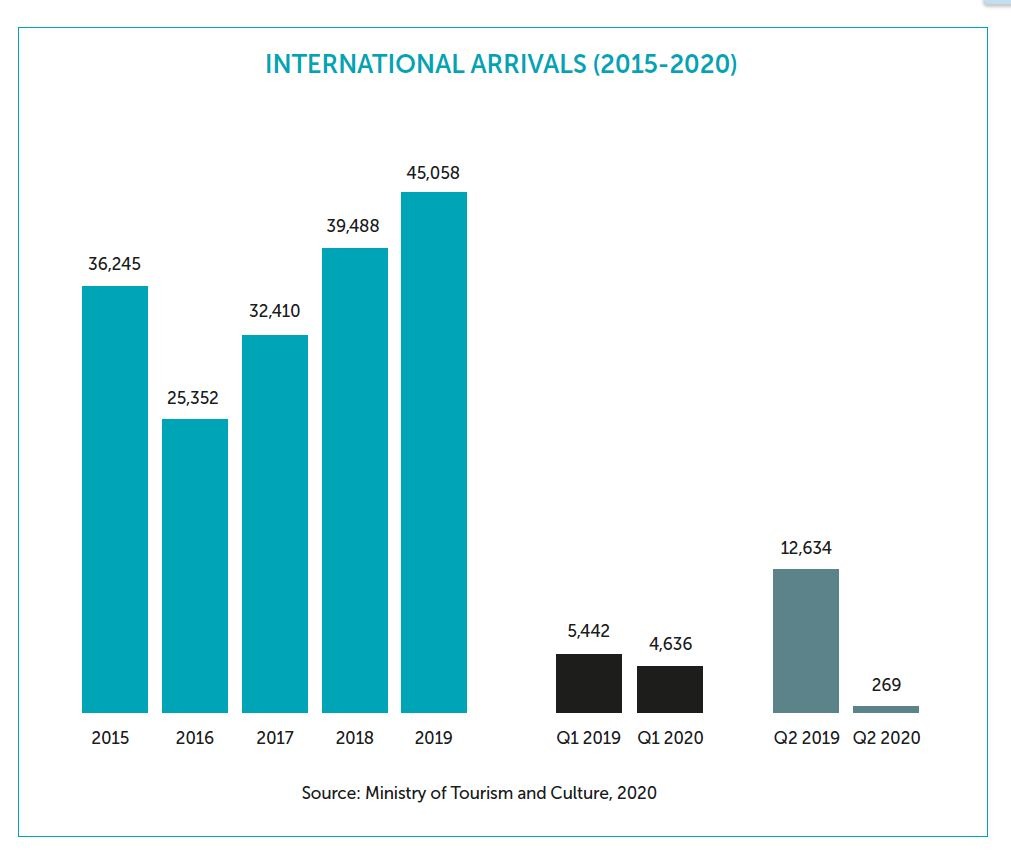
Turkey, unlike other countries in the region, benefits from diversified tourism, appealing to both domestic and international tourists. The sector is driven by a strong share of both leisure and corporate demand, in equal measure, thanks to its location and importance of the local economy. International tourism arrivals plummeted in 2016 due to the terror attacks and the political crisis with Russia. Tourism rebounded swiftly, growing from 25 million visitors in 2016 to 45 million visitors in 2019. Moving forward, the Turkish government aims to increase the number of international arrivals to 65 million within five years. Achieving this target, however, will be dependent on the pace of recovery in the post-Covid era of travel.
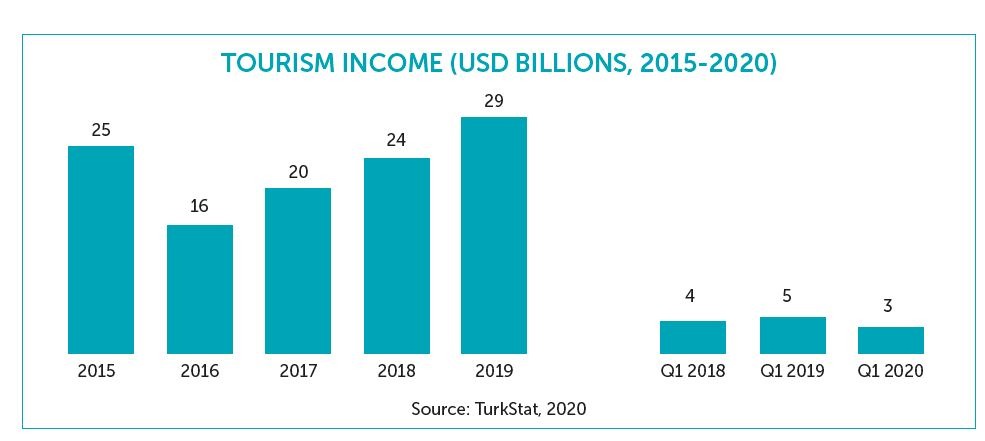
Total tourism income exhibited a parallel trend with international arrivals between 2015 and 2020. Turkey’s Ministry of Culture and Tourism aims to increase tourism income in the next five years by focusing on growing niche segments, as golf, medical and halal tourism, diversifying the tourism portfolio and appealing to new source markets with higher average expenditure per capita.
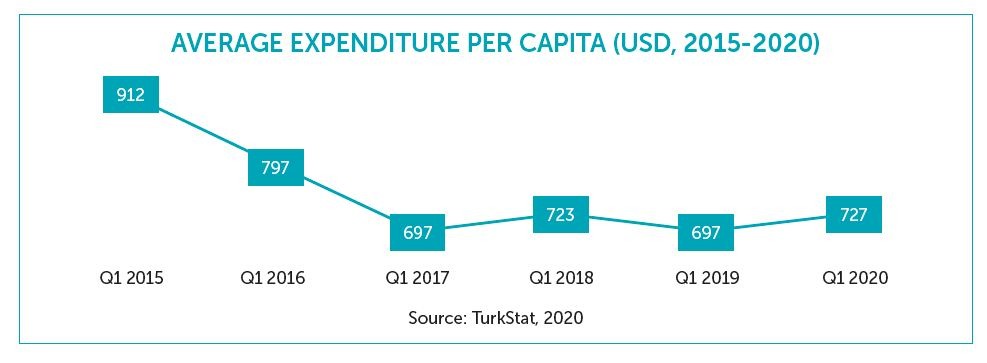
In contrast with the international arrivals and tourism income, average expenditure per capita has been declining in the last five years, registering a negative CAGR of -4 percent between Q1 2020 and Q1 2015. Average expenditure per capita for Turkish tourism has historically been subpar compared to other European destinations mainly due to the devaluation of the Turkish lira against other currencies and the prevalence of all-inclusive resorts in the coastal areas at heavily discounted rates. Therefore, average expenditure per capita has been identified as the most important KPI by the Ministry of Culture and Tourism as the country moves towards achieving its Vision 2023 tourism goals. In order to increase the average spending, Turkey aims to further diversify its source markets, grow the average length of stay and focus on alternative tourism offerings.
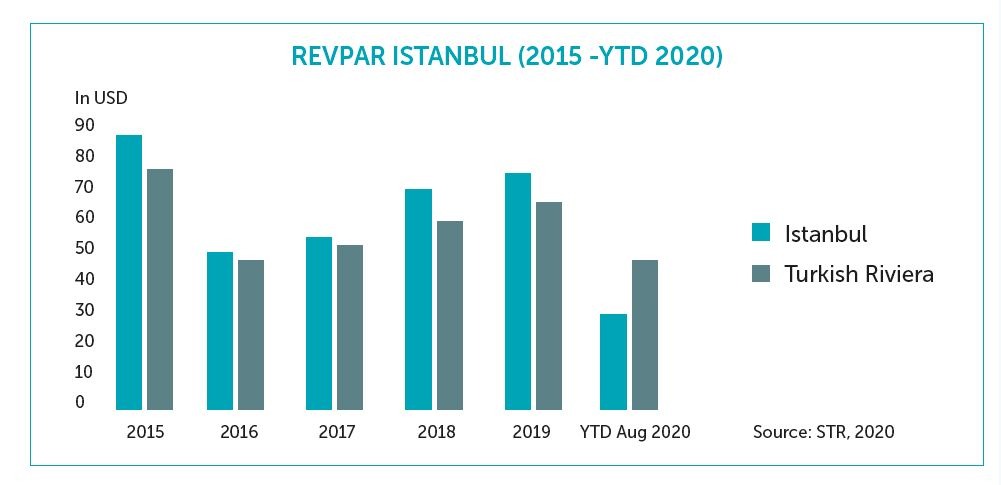
In line with the rise in tourism arrivals, hotel performance embarked on an upward trend in 2017 and continued until the beginning of 2020. As a result of rising ADR and occupancy levels, RevPAR increased by 51 percent and 36 percent in Istanbul and the Turkish Riviera respectively between 2016 and 2019. Due to the travel restrictions and border closures following the spread of Covid-19, RevPAR decreased by more than 50 percent in Istanbul and 35 percent in the Turkish Riviera in the first eight months of 2020. With domestic flights commencing at the beginning of June and given strong domestic demand during the summer, the Turkish Riviera sub-market has shown more resilience compared to Istanbul.
Opportunities and challenges for Turkish tourism ahead of 2023
Opportunities
• In the last decade, Turkey has become a medical tourism hot spot appealing to visitors from the Middle East and Europe primarily for hair transplant, eye surgery, plastic surgery and physiotherapy treatments. Turkey has the potential to capture a larger share of the global medical tourism market in the future with its state-of-the-art hospitals, qualified medical personnel and world-class infrastructure.
• According to Singapore-based Muslim travel specialist Crescentrating’s 2020 report, Turkey ranks third globally as a halal-friendly tourism destination. The country will continue to be at the forefront of halal travel, which is a lucrative market that has witnessed exponential growth in recent years.
• The completion of Istanbul Airport — which will be one of the largest airports in the world with the capacity to accommodate 200 million passengers per year once all phases have been completed will improve Turkey’s accessibility even further. Other mega-projects under development, such as Galataport, Istanbul Channel (Kanal Istanbul) and Istanbul Financial Center, will complement Turkey’s tourism offering.
• The Ministry of Culture and Tourism’s continued efforts on the promotion of the country through various initiatives and the growing network of Turkish Airlines will ensure the sustainability of Turkey’s tourism growth in the upcoming years.
• Turkey has a stable domestic tourism demand base, which will offset the detrimental impact of Covid-19 on the country’s tourism income in the short term. The Turkish government has various initiatives in place to promote the country as a safe destination with extensive sanitization protocols in hotels, airlines and other tourism establishments.
Challenges
• Geopolitical tensions and regional instability deterring foreign direct investment and impacting Turkey’s perception adversely remain a concern.
• Depreciation of the Turkish lira impacts the long-term economic visibility and the investment sentiment.
To conclude, we believe that the new safety regulations, easing of the international travel restrictions and strong domestic tourism demand will accelerate Turkey’s tourism recovery in the short term. In the medium-to long-term, we expect the tourism revenues to increase significantly on account of the government’s drive to diversify the source markets and attract tourists with higher disposable income.
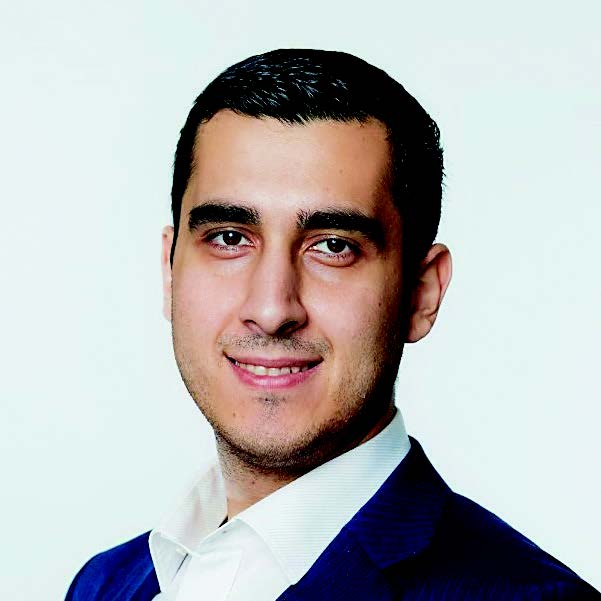
Ersin Yildirim,
Senior Manager
HVS Middle East & Africa

















